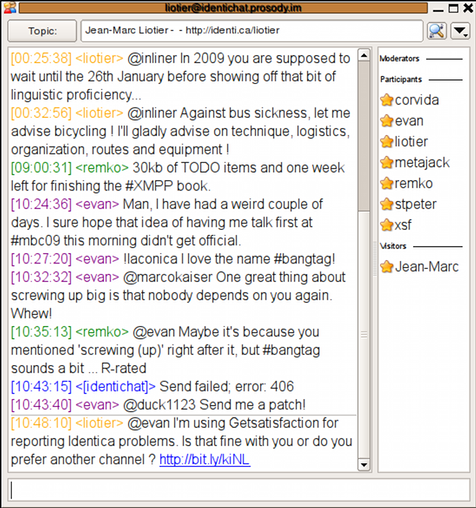If you want to skip the making-of story, you can go straight to the laconica2IRC.pl script download. Or in case anyone is interested, here is the why and how…
Some of my best friends are die-hard IRC users that make a point of not touching anything remotely looking like a social networking web site, especially if anyone has ever hinted that it could be tagged as “Web 2.0” (whatever that means). As much as I enjoy hanging out with them in our favorite IRC channel, conversations there are sporadic. Most of the time, that club house increasingly looks like an asynchronous forum for short updates posted infrequently on a synchronous medium… Did I just describe microblogging ? Indeed it is a very similar use case, if not the same. And I don’t want to choose between talking to my close accomplices and opening up to the wider world. So I still want to hang out in IRC for a nice chat from time to time, but while I’m out broadcasting dents I want my paranoid autistic friends to get them too. To satisfy that need, I need to have my IRC voice say my dents on the old boys channel.
The data source could be an OpenMicroblogging endpoint, but being lazy I found a far easier solution : use Laconi.ca‘s Web feeds. Such solution looked easier because there are already heaps of code out there for consuming Web feeds, and it was highly likely that I would find one I could bend into doing my bidding.
To talk on IRC, I had previously had the opportunity to peruse the Net::IRC library with great satisfaction – so it was an obvious choice. In addition, in spite of being quite incompetent with it, I appreciate Perl and I was looking for an excuse to hack something with it.
With knowledge of the input, the output and the technology I wanted to use, I could start implementing. Being lazy and incompetent, I of course turned to Google to provide me with reusable code that would spare me building the script from the ground up. My laziness was of course quick to be rewarded as I found rssbot.pl by Peter Baudis in the public domain. That script fetches a RSS feed and says the new items in an IRC channel. It was very close to what I wanted to do, and it had no exotic dependancies – only Net::IRC library (alias libnet-irc-perl in Debian) and XML::RSS (alias libxml-rss-perl in Debian).
So I set upon hacking this script into the shape I wanted. I added IRC password authentication (courtesy of Net::IRC), I commented out a string sanitation loop which I did not understand and whose presence cause the script to malfunction, I pruned out the Laconi.ca user name and extraneous punctuation to have my IRC user “say” my own Identi.ca entries just as if I was typing them myself, and after a few months of testing I finally added an option for @replies filtering so that my IRC buddies are not annoyed by the noise of remote conversations.
I wanted my own IRC user “say” the output, and that part was very easy because I use the Bip an IRC proxy which supports multiple clients on one IRC server connection. This script was just going to be another client, and that is why I added password authentication. Bip is available in Debian and is very handy : I usually have an IRC client at home, one in the office, occasionally a CGI-IRC, rarely a mobile client and now this script – and to the dwellers of my favorite IRC channel there is no way to tell which one is talking. And whichever client I choose, I never missing anything thanks to logging and replay on login. Screen with a command-line IRC client provides part of this functionality, but the zero maintainance Bip does so much more and is so reliable that one has to wonder if my friends cling to Irssi and Screen out of sheer traditionalism.
All that remained to do was to launch the script in a sane way. To control this sort of simple and permanently executed piece of code and keep it from misbehaving, Daemon is a good way. Available in Debian, Daemon proved its worth when the RSS file went missing during the Identi.ca upgrade and the script crashed everytime it tried to access it for lack of exception catching. Had I simply put it in an infinite loop, it would have hogged significant ressources just by running in circles like a headless chicken. Daemon not only restarted it after each crash, but also killed it after a set number of retries in a set duration – thus preventing any interference with the rest of what runs on our server. Here is the Daemon launch command that I have used :
#!/bin/bash
path=/usr/local/bin/laconica2IRC
daemon -a 16 -L 16 -M 3 -D $path -N -n laconica2IRC_JML -r -O $path/laconica2IRC.log -o $path/laconica2IRC.log $path/laconica2IRC.pl
And that’s it… Less cut and paste from Identi.ca to my favorite IRC channel, and my IRC friends who have not yet adopted microblogging don’t feel left out of my updates anymore. And I can still jump into IRC from time to time for a real time chat. I have the best of both worlds – what more could I ask ?
Sounds good to you ? Grab the laconica2IRC.pl script !
